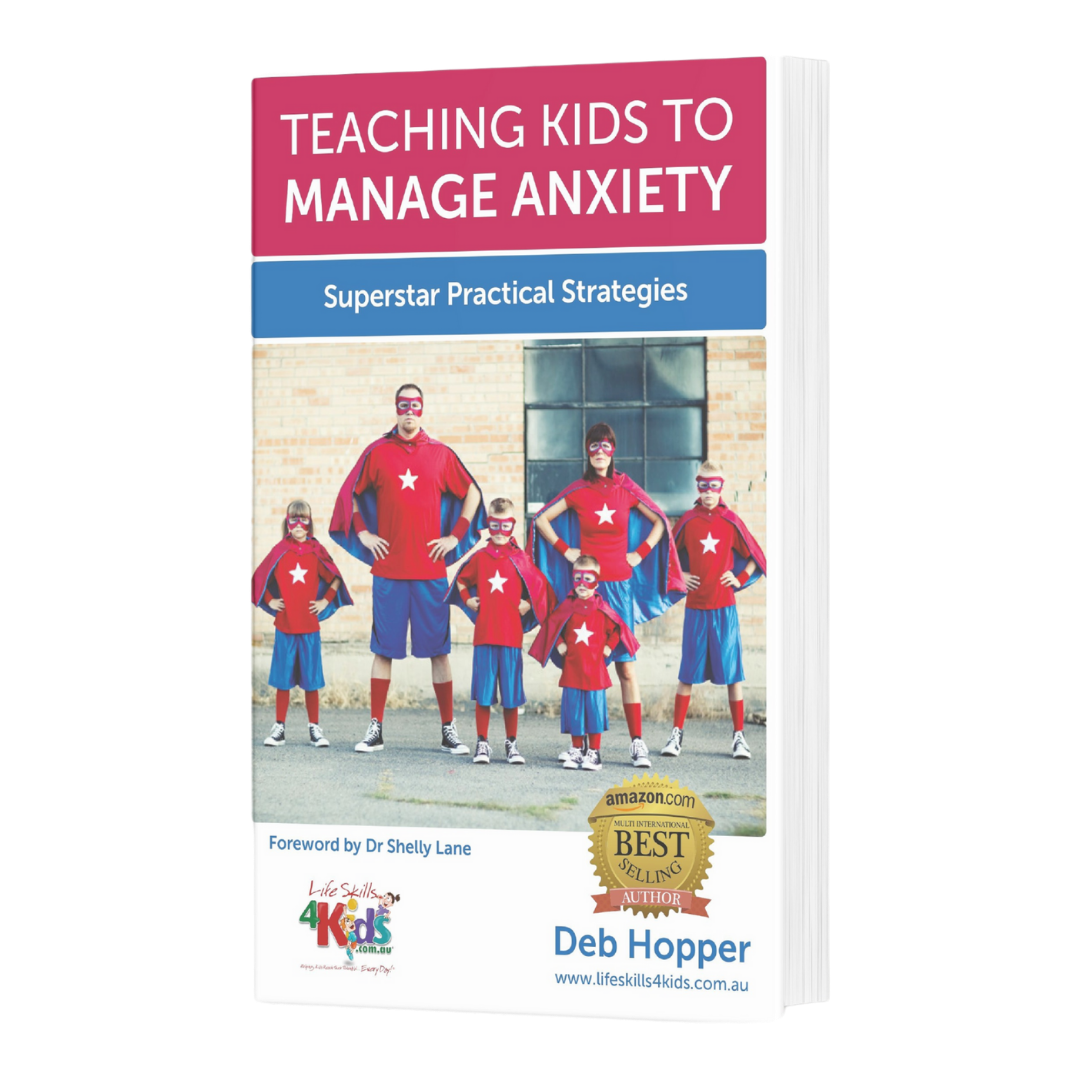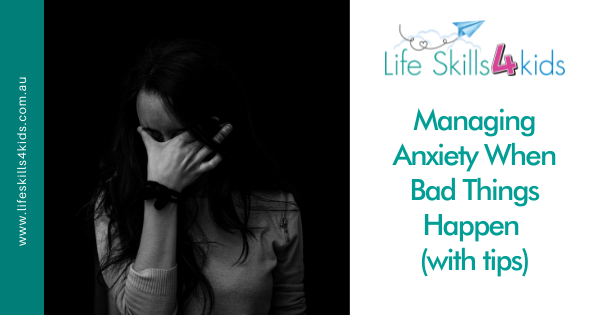Many children and adults are experiencing heightened worry and anxiety as our world faces wars and natural disasters, unlike anything we have seen in our lifetimes. Our TVs and newsfeeds are full of bad news and terrible things happening to ordinary people just like us.
Worse still, there is nothing we can do to control the situations we find ourselves in. We cannot stop floods or armies, no matter how much we might want to.
Staying sane when the world goes crazy
That leaves one option open to us. We must do what we can to manage our response to these things because it’s the only way we can stay mentally healthy in a crazy world.
Children are especially vulnerable to anxiety and worry over the things that happen in the world. As parents and caregivers, we need to model healthy ways to manage anxiety as well as be aware of our own mental health needs.
Check out the following tips for ways to help the whole family deal with the worry of living with events such as wars and floods.
Managing anxiety over world events: tips for a stress-free life
1. Turn off the TV
While it’s good to be informed, the TV can be a constant source of bad news and worrying developments in the world. Too much exposure to the news can exacerbate depression and anxiety, so the best thing to do is limit TV time.
Children are especially affected by the news, and the scenes from the TV can very quickly become real to young minds. Taking some time out from the news or limiting your child’s exposure to it is crucial if world events are causing your child to suffer from anxiety.
2. Take action: do something to help
Contributing to a cause or doing something to help others is an excellent way to help your child refocus on something besides their worries.
You might be able to get involved with fundraising for flood victims or help in more practical ways if you live in a flood-affected area. Even if it is just something simple such as providing bottles of water or food to volunteers, your efforts will be appreciated (and useful) and will help your child to feel better.
You could get involved in a charity for the victims of war or one that supports refugees, or you could send messages of support to people who have been displaced by fighting. In the case of the war in Ukraine, you could try to find out if any Ukrainian people live in your area and reach out to offer your support. Sometimes a listening ear or some empathy is greatly appreciated by others and will help you and your child to feel that you have done something positive.
3. Replace the news with something positive
If you still want to enjoy some TV time as a family, why not replace it with something positive? You could watch a documentary or find a good-news story about someone doing something good in the world. There are many stories of people who have done brave or heroic things in the face of great adversity so that they can make a difference.
Laughter is also a wonderful way to feel good, so why not watch a funny movie together or read a humorous story aloud?
4. Get moving
Exercise is one of the best ways to manage anxiety. It stimulates the release of our feel-good hormones and helps to drive away the blues.
Encourage your child to get outside and play, take the dog for a walk, or go for a bike ride together. Everyone will benefit from a positive mood boost.
5. Do something together and provide a listening ear
Provide opportunities for your child to open up to you about the things that are worrying to them. One of the best ways to do this is to do something together, such as making something, playing a game, or going for a walk to the park.
While you’re together, look for openings to start a conversation about what’s on your child’s mind. Make sure you take a neutral approach and don’t react negatively to anything your child says. When you provide a safe environment, it’s much easier for your child to open up about the things that are bothering them.
6. Spend time in nature
Nature is wonderfully soothing and healing. When you’re outside in the fresh air and the birds are singing and you have trees or greenery around you, it’s a welcome break from the trouble in the world. Kids love to learn about the natural world, especially if you encourage an interest in it. Helping your child learn about nature is relaxing and fun and a great way to escape from the stress and problems we face.
7. Limit social media exposure
Social media is another avenue of stress and anxiety, especially for older children who are more likely to have social media accounts of their own.
You can set some rules about how much time they can spend on screens or particular sites, then be prepared to stand your ground if you meet with resistance. Replace screen time with family time, exercise, or have a book night where you each read aloud from your favourite book. There are plenty of ways to engage teenagers or older children in the real world, and all it takes is a little imagination and a willingness to stand firm on the boundaries you’ve set.
What to do when a friend or loved one is in danger
Sometimes our worry and anxiety are entirely reasonable if a friend or loved one is in harm’s way. How do you manage anxiety when you might not have heard if a loved one has made it to safety? What can you do when you’re far away and cannot offer physical support?
1. Adopt a positive mindset
While we can never be certain that a loved one will come through a crisis without harm, having a positive mindset will do wonders for our own mental health and wellbeing. It can mean the difference between being able to cope and falling apart.
2. Belief in a higher power
While not everyone believes in a higher power, for those that do, it can be helpful to lean on that belief in times of crisis. Prayer, meditation, or contemplation can be calming and soothing, and children often respond well to these methods of dealing with stress and anxiety. There are also child-specific meditations or “mind scenes” that make use of a child’s imagination to help them feel calm and relaxed.
3. Find a support group
When widespread disasters occur, many people are affected, so there’s every chance that you’re not alone in your concern for someone who’s living through it. Find a support group or start your own, where you will find others who are going through similar experiences and can share your feelings with people who understand.
4. Seek counselling
When appropriate, seek counselling, especially if your loved one or friend has come to harm during a disaster and it’s affecting your own mental health. A professional will help you process the feelings and stress you are experiencing, a crucial step for coping.
If you would like to know more ways to support your child or other family members who suffer from anxiety, head over to my website, lifeskills4kids.com.au, where you will find lots of useful tips and helpful resources.
Teaching Kids to Manage Anxiety
Kids today are growing up in a fast-paced world where information and opportunity overload can be overwhelming.
Based on many years of clinical experience as an Occupational Therapist, Deb Hopper has been using her Just Right Kids® Model to teach children to communicate and manage their stress and anxiety by:
- Identifying their “body speed”,
- Understanding their stress triggers, and
- Implementing simple strategies to reduce anxiety and stress.
“This is quite simply the best, most comprehensive and practical bookI have ever read to help teach children – and many grownups – how to manage anxiety. It is written in an easy to read way with lots of fabulous graphics. This brilliant book needs to be in every home, every school and every library.” — Parenting author and educator Maggie Dent
Explore
- How the body reacts to anxiety and impacts on our ability to think and get an action plan together
- How to teach your children to identify when their body and mind is anxious, and how to tell you
- Sensory overload and how this can push children into being anxious
- Strategies to reduce screen time that you can start today (because this will help reduce anxiety in your house and make life more peaceful


